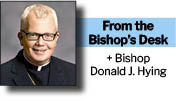
Whenever I have taught the Ten Commandments to youth, I begin by posing the following scenario: How would you feel if you came home from school today and your parents announced that there are no more rules in the family?
You can come home whenever you want, do whatever you want, or not even come home at all.
After thinking about it for a minute, the youth have always responded that they would hate not having rules.
Life would be chaos and they would feel that their parents did not love them or care about them in such a case.
Accepting the law
The First Reading for Mass this Sunday is the Lord’s issuance of the Ten Commandments to Moses on Mount Sinai.
By giving them the Law, God shows His love for the Chosen People.
He wanted them to experience the fullness of life in relationship with Him, to love God and neighbor, to refrain from sin, and to become holy.
The Commandments, the Beatitudes, the Gospels, and the teachings of the Church are all signposts on the road to Heaven to keep us on track, to free us from sadness and selfishness, to lead us to the abundance of joy and peace which the Lord so ardently desires for us.
So much of the chaos in the world today stems from a fundamental rejection of the truths revealed by God.
Every aspect of our human experience has first principles, immutable laws, rules, directions, and order.
The laws of nature, the principles of scientific inquiry, the fundamentals of mathematics, the structure of music, the rules governing football, all give structure, order, and integrity.
Imagine going to a concert where the musician simply played discordant notes.
Picture attending a football game without any rules, even without a clear definition of a touchdown.
No one is a relativist about the rules of a thing about which they are passionate.
Just try playing a game with children and suggest changing the rules.
They know the rules of the game and will insist you play by them.
So why are so many people relativists about morality, when rules apply for everything else?
If order, law, structure, and rule do indeed govern every aspect of reality, how then can it be different for the moral life?
The fundamental error of our culture is the rejection of the natural law, that interior knowledge which the Lord has planted in our hearts, so that we can flourish in relationships of joy, self-giving, and holiness.
The ideologies of abortion, transgenderism, same-sex marriage, contraception, materialism, and secularism reject God’s law and we can view the tragic results all around us.
I may say I do not believe in the law of gravity, but I will still fall and hurt myself if I jump off a roof.
Millions of abortions, children with mutilated bodies, the crisis of marriage and family, and the persistence of material and spiritual poverty all speak to the destructive consequences of sin in general and the sexual revolution in particular.
Moral self-examination
Lent is a profound time for us to take a moral inventory of our lives, to study the Ten Commandments, the Beatitudes, the precepts of the Church, the teachings of Christ, and the beauty of the Catechism to assess how well we are living as the Lord intends for us.
While we may not be in serious sin, God is always calling us to go deeper in the spiritual life, to not only avoid the bad, but to do the good with ever greater generosity and joy.
This moral self-examination will lead us to insight regarding our sinfulness, contrition when we are convicted of our need for mercy, and conversion as we seek to change.
Such prayerful introspection is a perfect preparation for Confession, as we acknowledge our sins before the Lord and seek His forgiveness and reconciliation.
If you do not go to Confession regularly, I urge you to go once a month for a year, and then see if you are not more at peace, more joyful, freer from habitual sins and failings, more generous and alive.
You simply will be.
How could you not, since the Lord bestows such graces upon us in this sacrament?
Confession is the only place I can go in, burdened with guilt, sin, remorse, and sadness, and then leave liberated, forgiven, and joyous.
In confessing my sins, I show my wounds to the Lord and He heals me, applying the medicine of His mercy and pardon to the failures and darkness of my selfishness.
The Scriptures speak of metanoia, the Greek word for conversion, which literally means turning around.
When we encounter the extraordinary love of God, such an explosion of grace literally turns us around, sets us on fire, and propels us to live our faith with a passionate energy which becomes electric and contagious.
We see this in the lives of the saints over and over again.
This Lent, the Lord is inviting us to leave sin behind, to confess our faults, to study His Commandments and teachings, and to find new life in a deep conversion of the heart.
God’s rules are the love of a provident Father who wants to see all of His children come home!

